外研版英语七年级下册Module11单元测试题-试卷(含听力原文-解析-答案)
- 格式:doc
- 大小:199.50 KB
- 文档页数:17
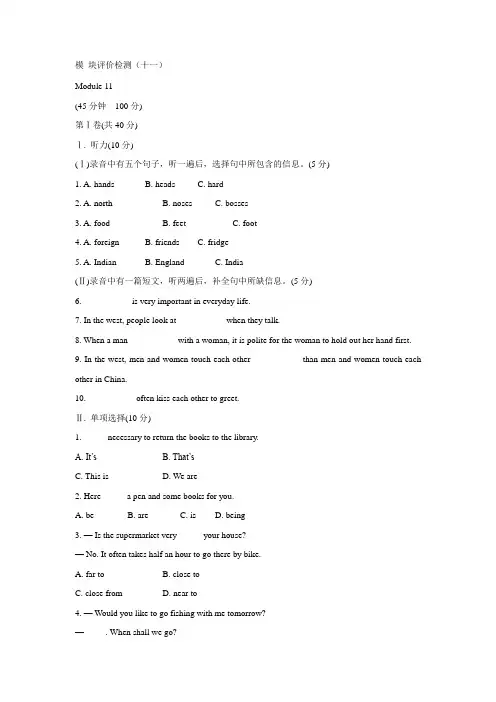
模块评价检测(十一)Module 11(45分钟100分)第Ⅰ卷(共40分)Ⅰ. 听力(10分)(Ⅰ)录音中有五个句子,听一遍后,选择句中所包含的信息。
(5分)1. A. hands B. heads C. hard2. A. north B. noses C. bosses3. A. food B. feet C. foot4. A. foreign B. friends C. fridge5. A. Indian B. England C. India(Ⅱ)录音中有一篇短文,听两遍后,补全句中所缺信息。
(5分)6. _____ _____ is very important in everyday life.7. In the west, people look at _____ _____ when they talk.8. When a man _____ _____ with a woman, it is polite for the woman to hold out her hand first.9. In the west, men and women touch each other _____ _____ than men and women touch each other in China.10. _____ _____ often kiss each other to greet.Ⅱ. 单项选择(10分)1. _____ necessary to return the books to the library.A. It’sB. That’sC. This isD. We are2. Here _____ a pen and some books for you.A. beB. areC. isD. being3. — Is the supermarket very _____ your house?— No. It often takes half an hour to go there by bike.A. far toB. close toC. close fromD. near to4. — Would you like to go fishing with me tomorrow?—_____. When shall we go?A. That’s all rightB. That’s rightC. RightD. All right5. (2012·永州中考) _____ get off the bus before it stops.A. Don’tB. Doesn’tC. Didn’t6. They entered the room _____.A. arm with armB. arm to armC. arm in armD. arm on arm7. My friend _____ the book with him when he came to see me.A. tookB. carriedC. broughtD. got8. One of you will stay here, and the others will _____.A. take awayB. move awayC. put awayD. give away9. — Do you know why he failed (失败)?—I think that’s _____ he is too careless.A. becauseB. whyC. soD. for10. (2012 ·杭州中考) Mom makes me eat an apple every day _____ the doctor away.A. keepsB. is keptC. to keepD. keptⅢ. 完形填空(10分)People use body language to send messages to others. It is very 1 because others can understand you easily when you use body language. When you are talking with others, you are not just using words, but also using 2 . For example, waving one’s hand is to say “Good-bye”. Shaking hands means welcome, and clapping hands 3 congratulations(祝贺). Nodding the head means YES, but shaking the head means NO.Different countries have 4 body languages. For example, when in 5 , France and Arab countries kiss each other when they meet, 6 men in China or Australia shake hands. People in Puerto Rico like touching each other, but people in Britain do not touch each other. People in Arab countries like 7 close to one another when they are talking, but English people must keep a distance away when they are talking. It is very important 8 the meanings of gestures and movements in the foreign country 9 they will help you communicate with people and make you stay there much more 10 and comfortable.1. A. helpful B. difficult C. easy D. useless2. A. words B. gestures C. handshake D. hands3. A. to mean B. meanC. meansD. meaning4. A. the same B. a sameC. the differentD. different5. A. Russia B. the RussiaC. RussianD. a Russia6. A. and B. or C. but D. so7. A. stand B. standsC. sitD. standing8. A. knowing B. knowC. to knowD. knows9. A. when B. because C. so D. if10. A. important B. sadC. interestingD. pleasedⅣ. 阅读理解(10分)There are many TV programs on Chinese cuisine(烹饪) now. A Bite of Chinais a new program on diet (饮食)culture and it’s very popular. The CCTV ChannelOne show began to play on May 14th, 2012. It was held by award-winning documentary maker Chen Xiaoqing. The program tries to bring something new bypresenting more cultural elements related to dishes, such as eating habits and theethics(道德)of eating. It also offers insights into the geographical, historical andcultural dimensions of what Chinese eat. It can teach us how to make the food. Sothe program is sure to attract both food buffs and ordinary audiences.A Bite of China has seven episodes(片段). Each episode lasts 50 minutes. Themes range from ingredients to preserved food.Food is always connected with people. To get enough good stories, the production team spent three months doing research and interviews in about 60 cities before they started shooting last July. Filming lasted about nine months.A Bite of China captures social changes while presenting food cultures, such as, many families leave old people in their hometowns while other members work outside, the food of their hometown can remind of happy times.Chen says the seven episodes might not be enough to capture the glory of Chinese food culture.1. A Bite of China is begun to play in _____, 2012.A. MarchB. MayC. JulyD. September2. There are_____ episodes in the new program.A. 12B. 50C. 7D. 603. To get enough good _____, the production team spent three months doing research.A. storiesB. culturalC. eating habitsD. the ethics of eating4. What’s the meaning of the underlined word “presenting”?A. 礼物B. 呈现C. 面对D. 播映5. A Bite of China is about _____.A. a TV programB. food cultureC. how to make foodD. social changes第Ⅱ卷(共60分)Ⅴ. 词汇运用(10分)根据句意及首字母提示完成单词。
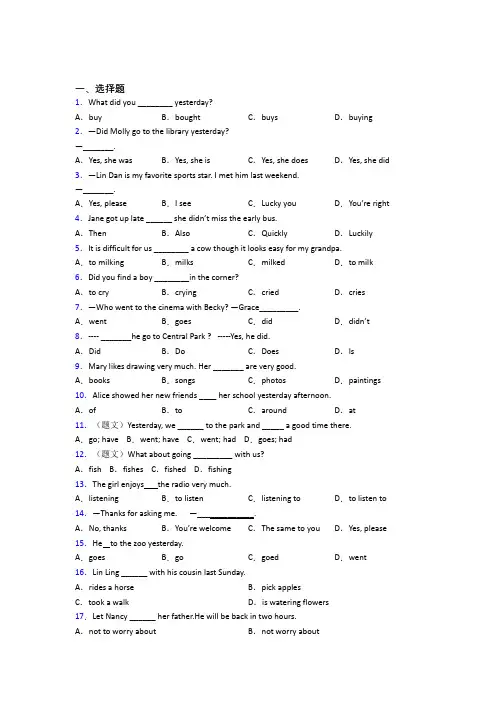
一、选择题1.What did you ________ yesterday?A.buy B.bought C.buys D.buying 2.—Did Molly go to the library yesterday?—_______.A.Yes, she was B.Yes, she is C.Yes, she does D.Yes, she did 3.—Lin Dan is my favorite sports star. I met him last weekend.—_______.A.Yes, please B.I see C.Lucky you D.You’re right 4.Jane got up late ______ she didn’t miss the early bus.A.Then B.Also C.Quickly D.Luckily 5.It is difficult for us ________ a cow though it looks easy for my grandpa.A.to milking B.milks C.milked D.to milk 6.Did you find a boy ________in the corner?A.to cry B.crying C.cried D.cries 7.—Who went to the cinema with Becky? —Grace_________.A.went B.goes C.did D.didn’t 8.---- _______he go to Central Park ? -----Yes, he did.A.Did B.Do C.Does D.Is 9.Mary likes drawing very much. Her _______ are very good.A.books B.songs C.photos D.paintings 10.Alice showed her new friends ____ her school yesterday afternoon.A.of B.to C.around D.at 11.(题文)Yesterday, we ______ to the park and _____ a good time there. A.go; have B.went; have C.went; had D.goes; had12.(题文)What about going _________ with us?A.fish B.fishes C.fished D.fishing13.The girl enjoys the radio very much.A.listening B.to listen C.listening to D.to listen to 14.—Thanks for asking me. —_____________.A.No, thanks B.You’re welcome C.The same to you D.Yes, please 15.He to the zoo yesterday.A.goes B.go C.goed D.went 16.Lin Ling ______ with his cousin last Sunday.A.rides a horse B.pick applesC.took a walk D.is watering flowers17.Let Nancy ______ her father.He will be back in two hours.A.not to worry about B.not worry aboutC.be not worried about D.not to be worried about18.—Who cooked the lunch today? — I _______.A.did B.does C.was D.do19.We went to the Great Wall ______ vacation.A.at B.on C.for D.to20.difficult for us take good photos.A.It’s; to B.It’s; for C.It; to D.It was; for【参考答案】***试卷处理标记,请不要删除一、选择题1.A解析:A【详解】句意:你昨天买啥了?考查动词用法。
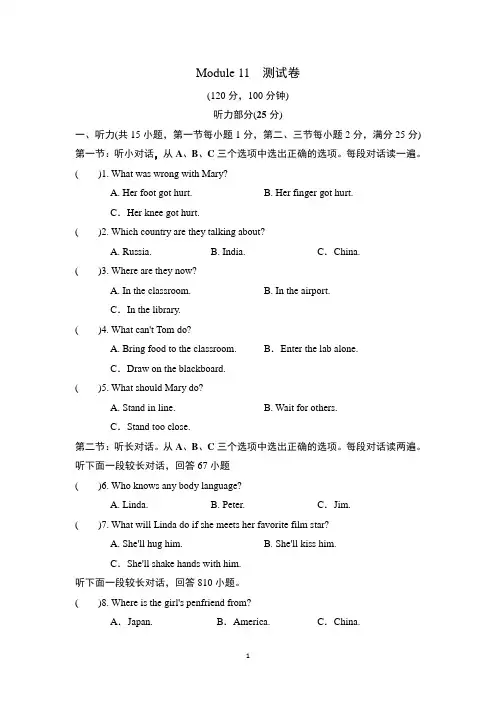
Module 11测试卷(120分,100分钟)听力部分(25分)一、听力(共15小题,第一节每小题1分,第二、三节每小题2分,满分25分) 第一节:听小对话,从A、B、C三个选项中选出正确的选项。
每段对话读一遍。
()1. What was wrong with Mary?A. Her foot got hurt.B. Her finger got hurt.C.Her knee got hurt.()2. Which country are they talking about?A. Russia.B. India. C.China.()3. Where are they now?A. In the classroom.B. In the airport.C.In the library.()4. What can't Tom do?A. Bring food to the classroom. B.Enter the lab alone.C.Draw on the blackboard.()5. What should Mary do?A. Stand in line.B. Wait for others.C.Stand too close.第二节:听长对话。
从A、B、C三个选项中选出正确的选项。
每段对话读两遍。
听下面一段较长对话,回答67小题()6. Who knows any body language?A. Linda.B. Peter. C.Jim.()7. What will Linda do if she meets her favorite film star?A. She'll hug him.B. She'll kiss him.C.She'll shake hands with him.听下面一段较长对话,回答810小题。
()8. Where is the girl's penfriend from?A.Japan. B.America. C.China.()9. What number don't Japanese like?A.4 and 14. B.4 and 9. C.14 and 19.()10. What do Japanese people do every day?A Shake hands. B.Learn numbers. C.Take a bath.第三节:听短文,选择正确答案。
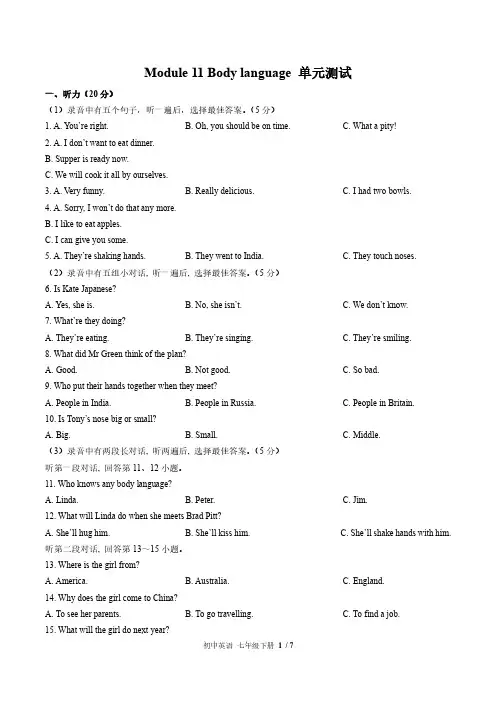
Module 11 Body language 单元测试一、听力(20分)(1)录音中有五个句子,听一遍后,选择最佳答案。
(5分)1. A. You’re right. B. Oh, you should be on time. C. What a pity!2. A. I don’t want to eat dinner.B. Supper is ready now.C. We will cook it all by ourselves.3. A. V ery funny. B. Really delicious. C. I had two bowls.4. A. Sorry, I won’t do that any more.B. I like to eat apples.C. I can give you some.5. A. They’re shaking hands. B. They went to India. C. They touch noses.(2)录音中有五组小对话, 听一遍后, 选择最佳答案。
(5分)6. Is Kate Japanese?A. Yes, she is.B. No, she isn’t.C. We don’t know.7. What’re they doing?A. They’re eating.B. They’re singing.C. They’re smiling.8. What did Mr Green think of the plan?A. Good.B. Not good.C. So bad.9. Who put their hands together when they meet?A. People in India.B. People in Russia.C. People in Britain.10. Is Tony’s nose big or small?A. Big.B. Small.C. Middle.(3)录音中有两段长对话, 听两遍后, 选择最佳答案。
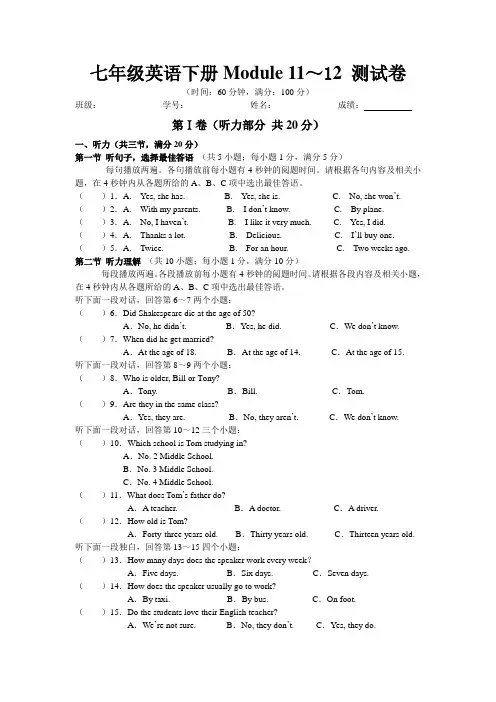
七年级英语下册Module 11~12 测试卷(时间:60分钟,满分:100分)班级:___________ 学号:____________ 姓名:____________ 成绩:第Ⅰ卷(听力部分共20分)一、听力(共三节,满分20分)第一节听句子,选择最佳答语(共5小题;每小题1分,满分5分)每句播放两遍。
各句播放前每小题有4秒钟的阅题时间。
请根据各句内容及相关小题,在4秒钟内从各题所给的A、B、C项中选出最佳答语。
()1.A. Yes, she has. B. Yes, she is. C. No, she won’t.()2.A. With my parents. B. I don’t know. C. By plane.()3.A. No, I haven’t. B. I like it very much. C. Yes, I did.()4.A. Thanks a lot. B. Delicious. C. I’ll buy one.()5.A. Twice. B. For an hour. C. Two weeks ago.第二节听力理解(共10小题;每小题1分,满分10分)每段播放两遍。
各段播放前每小题有4秒钟的阅题时间。
请根据各段内容及相关小题,在4秒钟内从各题所给的A、B、C项中选出最佳答语。
听下面一段对话,回答第6~7两个小题:()6.Did Shakespeare die at the age of 50?A.No, he didn’t. B.Yes, he did. C.We don’t know.()7.When did he get married?A.At the age of 18. B.At the age of 14. C.At the age of 15.听下面一段对话,回答第8~9两个小题:()8.Who is older, Bill or Tony?A.Tony. B.Bill. C.Tom.()9.Are they in the same class?A.Yes, they are. B.No, they aren’t. C.We don’t know.听下面一段对话,回答第10~12三个小题:()10.Which school is Tom studying in?A.No. 2 Middle School.B.No. 3 Middle School.C.No. 4 Middle School.()11.What does Tom’s father do?A.A teacher. B.A doctor. C.A driver.()12.How old is Tom?A.Forty-three years old. B.Thirty years old. C.Thirteen years old. 听下面一段独白,回答第13~15四个小题:()13.How many days does the speaker work every week?A.Five days. B.Six days. C.Seven days.()14.How does the speaker usually go to work?A.By taxi. B.By bus. C.On foot.()15.Do the students love their English teacher?A.We’re not sure. B.No, they don’t. C.Yes, they do.第三节、听取信息(共5小题;每小题1分,满分5分)听下面一段独白,请根据题目要求,从所听到的内容中获取必要的信息,并填入标号为16~20的横线上。
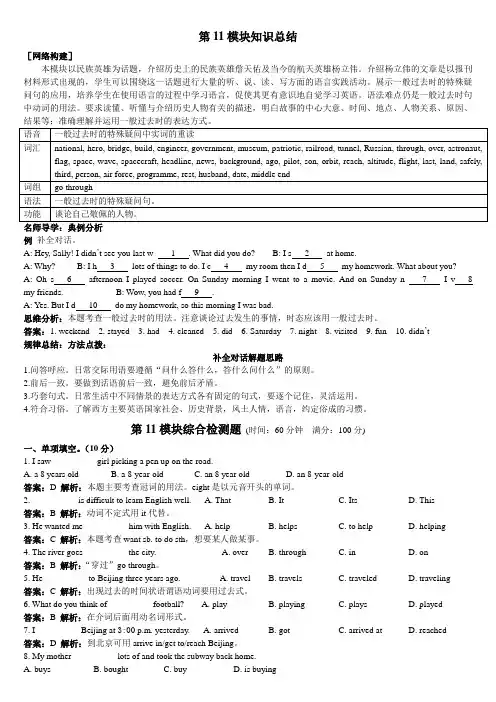
第11模块知识总结[网络构建]本模块以民族英雄为话题,介绍历史上的民族英雄詹天佑及当今的航天英雄杨立伟。
介绍杨立伟的文章是以报刊材料形式出现的,学生可以围绕这一话题进行大量的听、说、读、写方面的语言实践活动。
展示一般过去时的特殊疑问句的应用,培养学生在使用语言的过程中学习语言,促使其更有意识地自觉学习英语。
语法难点仍是一般过去时句中动词的用法。
要求读懂、听懂与介绍历史人物有关的描述,明白故事的中心大意、时间、地点、人物关系、原因、结果等;准确理解并运用一般过去时的表达方式。
例补全对话。
A: Hey, Sally! I didn’t see you last w 1 . What did you do? B: I s 2 at home.A: Why? B: I h 3 lots of things to do. I c 4 my room then I d 5 my homework. What about you? A: Oh s 6 afternoon I played soccer. On Sunday morning I went to a movie. And on Sunday n 7 I v 8 my friends. B: Wow, you had f 9 .A: Y es. But I d 10 do my homework, so this morning I was bad.思维分析:本题考查一般过去时的用法。
注意谈论过去发生的事情,时态应该用一般过去时。
答案:1. weekend 2. stayed 3. had 4. cleaned 5. did 6. Saturday 7. night 8. visited 9. fun 10. didn’t规律总结:方法点拨:补全对话解题思路1.问答呼应。
日常交际用语要遵循“问什么答什么,答什么问什么”的原则。
2.前后一致。
要做到话语前后一致,避免前后矛盾。
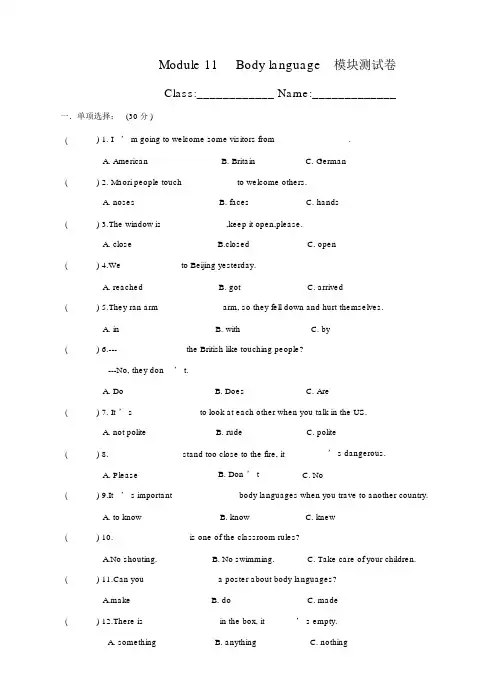
Module 11 Body language模块测试卷Class:____________ Name:_____________一.单项选择:(30 分 )() 1. I ’ m going to welcome some visitors from________________.A. AmericanB. BritainC. German() 2. Maori people touch____________to welcome others.A. nosesB. facesC. hands() 3.The window is______________,keep it open,please.A. closeB.closedC. open() 4.We_____________to Beijing yesterday.A. reachedB. gotC. arrived() 5.They ran arm______________arm, so they fell down and hurt themselves.A. inB. withC. by() 6.---_______________the British like touching people?---No, they don’ t.A. DoB. DoesC. Are() 7. It ’ s ______________to look at each other when you talk in the US.A. not politeB. rudeC. polite() 8.________________stand too close to the fire, it’ s dangerous.A. PleaseB. Don ’ tC. No() 9.It ’ s important ______________body languages when you trave to another country.A. to knowB. knowC. knew() 10.________________ is one of the classroom rules?A.No shouting.B. No swimming.C. Take care of your children. () 11.Can you________________a poster about body languages?A.makeB. doC. made() 12.There is____ ____________in the box, it’ s empty.A. somethingB. anythingC. nothing( () 13.Say_________________to your parents when you get home every day.A. helloB. goodbyeC. nothing) 14.The Japanese bow is a way of____________ ___polite and showing respect.A. beB. isC. being() 15.Give______________more personal space, he’ s not a child any more.A. themB. himC. his二.完形填空:(10 分)__1__important to know some body languages__2__you want to go to another __3__.For example,you can stand close __4__ people in the Middle East, but don ’ stand __5__close to NorthAmerican. Give them more personal space. __6__ girls often walk arm in arm with __7__ friends.Sometimes South American hold your arm when they talk to you, __8__ you can’ t move away. Please __9__careful! In Greece, it’ s not at all polite! In fact , It’ s very __10__. () 1.A. It B. It ’ s C. Its() 2.A. when B. where C. whose() 3.A. country B. countries C.city() 4.A. for B. to C. with() 5.A. too B. to C. two() 6.A.Chinese B.China C. America() 7.A. my B. our C. their() 8.A. and B.so C. but() 9.A. is B. be C. being() 10.A. polite B. rude C. happy三.判断正误:正确的写A,错误的写 B.(10分 )Once upon a time, there was a man who wanted to steal(偷 ) his neighbor’ s doorbell. However, heknew clearly that the bell would ring and c atch the other people’ s attention as long as he touchedthe bell. So he thought hard and suddenly had a clever plugged“h isdears”with.Hesomething,thinking that everything would go well when he stole the bell. Unluckily, the bell still rangloudly and he was caught on the spot as a thief.()1. The man wanted to steal his neighbor’ s money.()2.He wasn’ t afraid of catching the other people’ s attention.( ( ()3.The word plug in Line 3 means塞住“” in Chinese. )4. The man was caught on the spot as a thief at last. )5. The man is very clever.四.阅读理解:(10 分)In America when people meet each other for the first time, they talk about things like weather,family, work, school, or sports. They ask questions like“ Do you have any brothers or sisters?“ Where do you work?”“ What school do you go to?”and“ Do youTheylike alssp o rts?ask”questions like“ Where do you come from?” and“ Where do you live?” These are polite questi not personal questions.But some things are personal or private, and questions about them are not polite. People donask questions about a person ’salary (薪水 ). They don ’ task how much someone paid something. It is OK to ask children how old they are, but it is not polite to ask older people aboutfortheir age. It is also not polite to ask people questions about politics (政治 ) or religion (宗教 ) if youdon ’ t know them very well. People don’ t ask unmarried people“ Why are you single?”don ’ t ask a married couple withno children“ Why don’ t you have any children? ()1. The writer wants us to.A. be very friendly to people from AmericaB. find out a lot about AmericaC. know what questions are polite in America()2. According to this article, when you meet Americans, it is OK to ask them about their.A. average salaryB. favor ite sportsC. religious beliefs()3. When you meet Americans for the first time, the question such aspolite”is NOTA.“ Do you come from a big family?”B.“ Do you like playing baseball?”C.“ How much did your shoes cost?”()4. In Amer ica, it’ s OK to discuss politics with.(A. married couples ( 已婚夫妇 ))5. In America it is OK to ask aA. childB. manB. good friendsC. older peoplehow old he/she is.C. woman五.根据首字母及句意完成句子,每空一词。
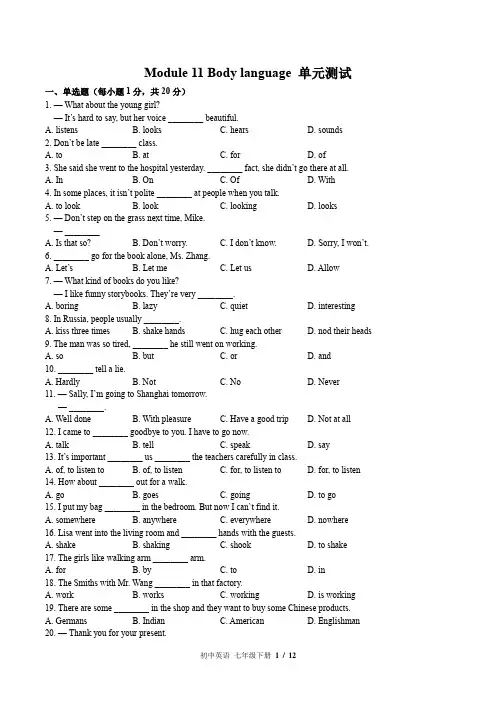
Module 11 Body language 单元测试一、单选题(每小题1分,共20分)1. — What about the young girl?— It’s hard to say, but her voice ________ beautiful.A. listensB. looksC. hearsD. sounds2. Don’t be late ________ class.A. toB. atC. forD. of3. She said she went to the hospital yesterday. ________ fact, she didn’t go there at all.A. InB. OnC. OfD. With4. In some places, it isn’t polite ________ at people when you talk.A. to lookB. lookC. lookingD. looks5. — Don’t step on the grass next time, Mike.— ________A. Is that so?B. Don’t worry.C. I don’t know.D. Sorry, I won’t.6. ________ go for the book alone, Ms. Zhang.A. Let’sB. Let meC. Let usD. Allow7. — What kind of books do you like?— I like funny storybooks. They’re very ________.A. boringB. lazyC. quietD. interesting8. In Russia, people usually ________.A. kiss three timesB. shake handsC. hug each otherD. nod their heads9. The man was so tired, ________ he still went on working.A. soB. butC. orD. and10. ________ tell a lie.A. HardlyB. NotC. NoD. Never11. — Sally, I’m going to Shanghai tomorrow.— ________.A. Well doneB. With pleasureC. Have a good tripD. Not at all12. I came to ________ goodbye to you. I have to go now.A. talkB. tellC. speakD. say13. It’s important ________ us ________ the teachers carefully in class.A. of, to listen toB. of, to listenC. for, to listen toD. for, to listen14. How about ________ out for a walk.A. goB. goesC. goingD. to go15. I put my bag ________ in the bedroom. But now I can`t find it.A. somewhereB. anywhereC. everywhereD. nowhere16. Lisa went into the living room and ________ hands with the guests.A. shakeB. shakingC. shookD. to shake17. The girls like walking arm ________ arm.A. forB. byC. toD. in18. The Smiths with Mr. Wang ________ in that factory.A. workB. worksC. workingD. is working19. There are some ________ in the shop and they want to buy some Chinese products.A. GermansB. IndianC. AmericanD. Englishman20. — Thank you for your present.— ________.A. It doesn’t matterB. Not at allC. Don’t say thatD. The same to you二、完型填空(每小题1分,共10分)It is said that eyes can speak. Do you have 21 a kind of experience? In a bus you may look at a stranger, but not too 22 . If he notices that he is being looked at, he may 23 uncomfortable. It is the same in daily life.When you are looked at for several more times, you will look 24 up and down in order to 25 if there is anything wrong with you. If 26 goes wrong, you will feel angry with the person who is looking at you. 27 can speak, right?Looking too long at someone may seem to be impolite. But sometimes things are 28 . If you wish to draw someone’s 29 , you may look at him or her more than ten seconds. For lovers, they enjoy looking at each other longer to show the love that words cannot 30 . Clearly, eye communication should be done according to the relationship between the two people and the certain situation.21. A. so B. such C. very D. quite22. A. late B. long C. low D. loud23. A. feel B. smell C. sound D. taste24. A. itself B. himself C. myself D. yourself25. A. see B. guess C. hear D. expect26. A. something B. nothing C. everything D. anything27. A. Ears B. Eyes C. Mouth D. Nose28. A. different B. difficult C. tiring D. boring29. A. direction B. lesson C. attention D. trouble30. A. write B. print C. read D. express三、阅读理解(每小题2分,共20分)(A)Can you speak English? Maybe you know a lot of English words. You can read, speak and understand English, but there is another kind of language — the language of the body. All over the world, people “talk” with their hands, their heads, and their eyes. When Japanese people meet, they bow. When Indians meet, they put their hands together. When British and American people meet someone for the first time, they shake hands. They do not usually shake hands with their friends. Women sometimes kiss their women friends, and men kiss women friends on the cheek(脸颊). When a man meets a man friend, he just smiles, and says “Hello”. Men do not kiss each other, or hold hands. Even fathers and sons do not often kiss each other.31. From the passage we know it is important to ________.A. know English wordsB. read and write EnglishC. know body languageD. greet(问候) others32. When Indians meet for the first time, ________.A. they bowB. they shake handsC. they kiss their friendsD. they put their hands together33. In America, it is NOT right for men to ________.A. kiss women friends on the cheekB. smile to men friendsC. say “Hello” to men friendsD. kiss men friends34. In America, when a man meets a man friend, he usually ________.A. shakes handsB. says “Hello”C. says “How do you do”D. kisses him35. Which of the following is body language?A. Read English.B. Wave hands to stop a taxi.C. Talk with a man.D. Listen to music.(B)When people meet each other for the first time in Britain, they say “How do you do and shake hands. Usually they do not shake hands when they just meet or say goodbye. But they shake hands after they haven’t met for a long time or when they will be away from each other for a long time.Last year a group of German students went to England for a holiday. Their teacher told them that the English people hardly(几乎不) shake hands. So when they met their English friends at the station, they kept their hands behind their backs. The English students had learned that the Germans shake hands as often as possible, so they put their hands in front and got ready to shake hands with them. It made both of them laugh.36. It is ________ if you know some of the customs(风俗) of the country.A. not usefulB. not helpfulC. very helpfulD. very bad37. English people usually shake hands when they ________.A. meet every timeB. meet for the first timeC. say hello to each otherD. say goodbye to each other38. Usually English people don’t shake hands ________.A. when they will be away for a long timeB. when they say “How do you do?”C. when they just meet or say goodbyeD. after they haven’t met for a long time39. Which is RIGHT?A. German people shake hands as often as possible.B. English people like shaking hands very much.C. German people hardly shake hands.D. Neither English people nor Germans(英国人和德国人双方都不) like shaking hands.40. This story is about ________.A. shaking handsB. languagesC. customsD. languages and customs四、根据首字母、句意及汉语提示写出所缺的单词(每小题1分,共5分)41. We often s________ hands with visitors in China.42. The boy pointed to the red apple with his f________.43. A new f________ student is going to study in our school.44. It’s p________ to give your seat(座位) to the old on the bus.45. Don’t t________ the water. It’s too hot.五、用所给单词的正确形式填空(每小题1分,共5分)46. — What are you doing?— I’m ________ (welcome) the new classmates with my friends.47. In some countries, “________ (nod) your head” means that you say “yes”.48. Who will come to show these ________ (visit) around our school?49. Russian people usually kiss three ________ (time) when they meet.50. Parents and ________ (child) should find more time to spend together.六、完成句子,每空一词(每小题1.5分,共7.5分)51. 对老师要礼貌。
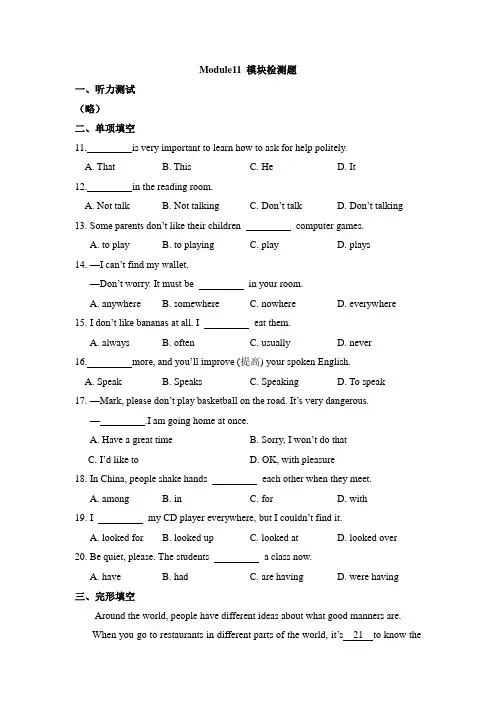
Module11 模块检测题一、听力测试(略)二、单项填空11. is very important to learn how to ask for help politely.A. ThatB. ThisC. HeD. It12. in the reading room.A. Not talkB. Not talkingC. Don’t talkD. Don’t talking13. Some parents don’t like their children computer games.A. to playB. to playingC. playD. plays14. —I can’t find my wallet.—Don’t worry. It must be in your room.A. anywhereB. somewhereC. nowhereD. everywhere15. I don’t like bananas at al l. I eat them.A. alwaysB. oftenC. usuallyD. never16. more, and you’ll improve (提高) your spoken English.A. SpeakB. SpeaksC. SpeakingD. To speak17. —Mark, please don’t play basketball on the road. It’s very dangerous.—.I am going home at once.A. Have a great timeB. Sorry, I won’t do thatC. I’d like toD. OK, with pleasure18. In China, people shake hands each other when they meet.A. amongB. inC. forD. with19. I my CD player everywhere, but I couldn’t find it.A. looked forB. looked upC. looked atD. looked over20. Be quiet, please. The students a class now.A. haveB. hadC. are havingD. were having三、完形填空Around the world, people have different ideas about what good manners are.When you go to restaurants in different parts of the world, it’s 21 to know theright and wrong things to do. For example, in China it’s OK to 22 a lot of noise in a restaurant. In fact, if a restaurant isn’t 23 you may think there’s something wrong with it. However, in many western 24 ,restaurants are quiet places. If a table is too loud, 25 people who are eating there might even complain (抱怨) to the owner of the restaurant.Paying the bill (账单) is also different from country to country. In China, one person usually pays for 26 .In western countries, one person pays if he or she is entertaining clients, but 27 friends eat together, they usually share the cost. This is called“going Dutch(均摊费用)”.Also, when westerners pay the bill, they usually leave some money for the 28 .This is called“leaving a tip”.Leaving a tip is thought to be 29 .In the US, it’s common (常见的) to leave tips of 10%,15%,or 20% of the bill, which is decided by how good the service is. Good waiters can make a lot of money!The way people eat food is different in the world, but you can 30 the same kind of food in many countries. Chinese and Italian food, for example, are popular all over the world.21. A. popular B. difficult C. important D. enjoyable22. A. cause B. keep C. hear D. make23. A. noisy B. friendly C. lucky D. polite24. A. families B. countries C. hospitals D. schools25. A. another B. others C. other D. the others26. A. everybody B. nobody C. somebody D. anybody27. A. until B. when C. unless D. since28. A. gatekeeper B. seller C. waiter D. visitor29. A. impolite B. polite C. strange D. interesting30. A. invent B. discover C. prefer D. find四、阅读理解AIn America when people meet each other for the first time, they talk about things like weather, family, work, school, or sports. They ask questions like “Do you haveany brothers or sisters?”“Where do you work?”“What school do you go to?”and “Do y ou like sports?” They also ask questions like “Where do you come from?” and “Where do you live?”These are polite questions, not personal questions.But some things are personal or private, and questions about them are not polite. People don’t ask questions about a person’s salary (薪水). They don’t ask how much someone paid for something. It is OK to ask children how old they are, but it is not polite to ask older people about their age. It is also not polite to ask people questions about politics (政治) or religion (宗教) if you don’t know them very well. People don’t ask unmarried people “Why are you single?” and they don’t ask a married couple with no children “Why don’t you have any children?”根据短文内容,选择最佳选项。
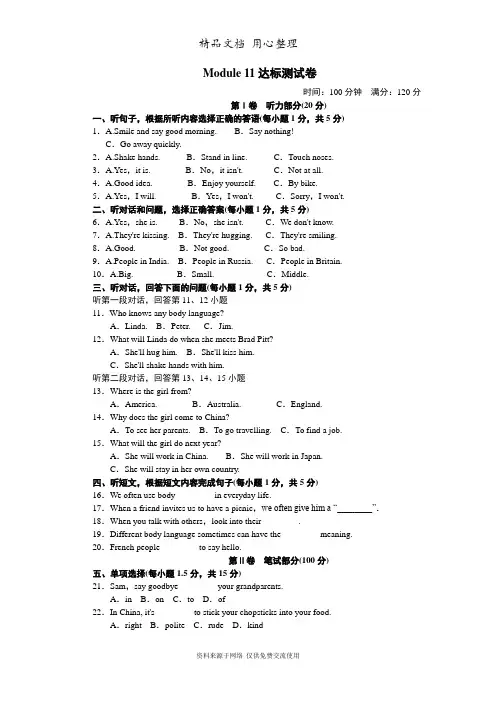
Module 11达标测试卷时间:100分钟满分:120分第Ⅰ卷听力部分(20分)一、听句子,根据所听内容选择正确的答语(每小题1分,共5分)1.A.Smile and say good morning.B.Say nothing!C.Go away quickly.2.A.Shake hands.B.Stand in line.C.Touch noses.3.A.Yes,it is. B.No,it isn't. C.Not at all.4.A.Good idea. B.Enjoy yourself. C.By bike.5.A.Yes,I will. B.Yes,I won't. C.Sorry,I won't.二、听对话和问题,选择正确答案(每小题1分,共5分)6.A.Yes,she is. B.No,she isn't. C.We don't know.7.A.They're kissing. B.They're hugging. C.They're smiling.8.A.Good. B.Not good. C.So bad.9.A.People in India. B.People in Russia. C.People in Britain.10.A.Big. B.Small. C.Middle.三、听对话,回答下面的问题(每小题1分,共5分)听第一段对话,回答第11、12小题11.Who knows any body language?A.Linda. B.Peter. C.Jim.12.What will Linda do when she meets Brad Pitt?A.She'll hug him. B.She'll kiss him.C.She'll shake hands with him.听第二段对话,回答第13、14、15小题13.Where is the girl from?A.America.B.Australia.C.England.14.Why does the girl come to China?A.To see her parents. B.To go travelling. C.To find a job.15.What will the girl do next year?A.She will work in China.B.She will work in Japan.C.She will stay in her own country.四、听短文,根据短文内容完成句子(每小题1分,共5分)16.We often use body ________ in everyday life.17.When a friend invites us to have a picnic,we often give him a “________”.18.When you talk with others,look into their ________.19.Different body language sometimes can have the ________ meaning.20.French people ________ to say hello.第Ⅱ卷笔试部分(100分)五、单项选择(每小题1.5分,共15分)21.Sam,say goodbye ________ your grandparents.A.in B.on C.to D.of22.In China, it's ________ to stick your chopsticks into your food.A.right B.polite C.rude D.kind23.He has his own way ________ his best friends.A.to welcome B.welcome C.welcomed D.welcomes24.They entered the room ________.A.arm with arm B.arm to armC.arm in arm D.arm on arm25.Li Ming and I are good friends.We often help ________.A.other each B.each other C.others each D.other26.—Is the supermarket very ________ your house?—No.It often takes me an hour to go there by bus.A.far from B.close to C.close from D.near to27.—________ up,Anna.It's seven thirty.—One more minute,Mum.A.Get B.Gets C.Getting D.Got28.My foreign teacher comes from ________,and he speaks________.A.German;German B.Japan;JapaneseC.Russian;Russia D.British;English29.________!There is some water on the floor.A.Be care B.Be careful C.Keep quiet D.Look up30.—Don't make the same mistake again.—No,I ________.A.don't B.won't C.mustn't D.can't六、完形填空(每小题1.5分,共15分)(词数:约100;建议用时:6分钟)Manners(礼貌)are important to keep good relations (关系)among people.No one ________(31) a person with bad manners.A ________(32) with good manners never laughs at people when they are in trouble.Instead,he________(33)to help them.When he asks for something,he says “________(34)”.And when he receives something,he ________(35) says “Thank you”.He does not interrupt(打扰)________(36) people when they are talking.He does not talk loudly or laugh loudly ________(37)public.When he sneezes,he uses a ________(38).If he is late for school,he ________(39) make an apology (道歉)to the teacher at once________(40) after class.31.A.thinks B.likes C.hates D.meets32.A.boys B.men C.person D.girls33.A.tries B.would C.has D.enjoys34.A.Give me B.Please C.Yes D.Hello35.A.never B.sometime C.usually D.still36.A.every B.else C.his D.other37.A.on B.at C.of D.in38.A.book B.cup C.handkerchief D.hand39.A.should B.will C.could D.needs40.A.or B.nor C.and D.but七、阅读理解(每小题2分,共20分)A(词数:约120;建议用时:6分钟)Americans are very direct people.When they want something, they say “yes”.When they don't want, they say “no”.If they want something different from what is given, they willask for it.Here's an example.I arrive at someone's house and he gives me wine, but I don't want wine.Maybe I don't like it or maybe I just don't want it.I will say “No, thanks.” If everyone around me is drinking something,I would ask for something else and say, “No, thanks.But I'll take a cup of tea.” If I really want wine,I just say,“Yes, please.”Unless they happen to know the Chinese customs, westerners will not ask you again and again after you have said you don't want it.41.According to the passage,________ are direct.A.Chinese B.Americans C.Japanese D.Australians42.If Americans want someth ing, they would say “________”A.Yes, please. B.No, thanks.C.No, I'm sorry. D.Yes, I don't like it.43.In this passage, the underlined word “westerners” means ________.A.the people who live in the west of their countryB.the visitors who go to the Western countriesC.the people who live in the Western countriesD.the people who know the customs of the West44.The Chinese people might ________ if you don't want anything given.A.be glad B.say “thank you”C.get angry D.ask you again and again45.From this passage we know that ________.A.the Chinese people are directB.the Chinese customs are betterC.the westerners are more politeD.different countries have different customsB(词数:约190;建议用时:7分钟)The meaning of shaking one's head is not always the same in different countries.Maybe some visitors would be surprised when they first come to India.Indians always shake their heads when they talk to others.But it does not have the same meaning as our “No”.If someone wants to visit India,he should know this,or it will give him some trouble.One day,a foreign officer went to India on business.He hired(雇用) an Indian to drive his car.When he told the driver to send him to his office,the Indian shook his head at once.The officer said again,but the driver shook his head again.At last,the officer,of course,got angry.“How dare(敢) you refuse(拒绝) my order?”he shouted.“Drive me to my office at once!”The driver answered in a quite loud voice,“Yes,sir!” But to the officer's surprise,the driver shook his head at the same time.The car started,and the foreign officer was too surprised to say a word.He thought about it for a while,and then he nodded with a smile. “No”__means__“Yes”__here!46.The passage mainly tells us about the ________ in India.A.body language B.clothes C.films D.festival47.An Indian will shake his head when he ________.A.gets angry B.agrees with othersC.waits for others D.gets tired48.The foreign officer was surprised that the driver________.A.shook his head as he said “Yes”B.couldn't understand himC.refused his orderD.shouted loudly49.The underlined sentence “‘No' means ‘Yes' here!”shows ________.A.in India the words “Yes” and “No” have the same meaningB.Indians don't say “No” when they disagree with each otherC.we shake our head s to say “No” while Indians do so to mean “Yes”D.Indians don't usually use the word “Yes” as much as “No”50.Which of the following is NOT true according to the passage?A.The driver didn't want to take the officer to his office.B.In China shaking one's head means “No”.C.In India people sometimes use the word “Yes”.D.When an Indian shakes his head,he really means “Yes”.八、任务型阅读(每小题2分,共10分)(词数:约230;建议用时:10分钟)When the teacher asks a question in class,Wang Xiaobin never raises his hand and this situation is very common at middle schools.This 15-year-old boy always waits for other classmates or the teacher to give the answer.“What if my answer is wrong?” Wang asks.Wang said only six or seven students in his class raise their hands when a question is asked.(53)“I__think__it's__a__problem__that__may__affect(影响)our__studies,but__I__am__afraid__of__making__mistakes__in__front__of__my__classmates,” he said.When we asked the teacher,Hu Wei, why the students didn't raise their hands,he said,“They lack(缺乏) confidence,they are afraid of showing off,or they're afraid of losing face by giving wrong answers.”To encourage students to raise their hands in class,Hu suggests that teachers should repeat the question, and then try to guide and encourage students to offer their answers.(54)Hu__also__advises__students__not__to__be__shy,but__to__be__brave__enough__to__try.Sun Pin,16 of Fujian,always raises her hand as soon as she comes up with the answer,even if she isn't sure whether she has gotten it right.Sun can't understand why some of her classmates keep silent in class.She enjoys raising her hand a lot.“It keeps me enthusiastic(热情的)and confident to express my idea,” Sun said.“Raising my hand has really made me excellent.”任务一:根据短文内容简要回答问题。
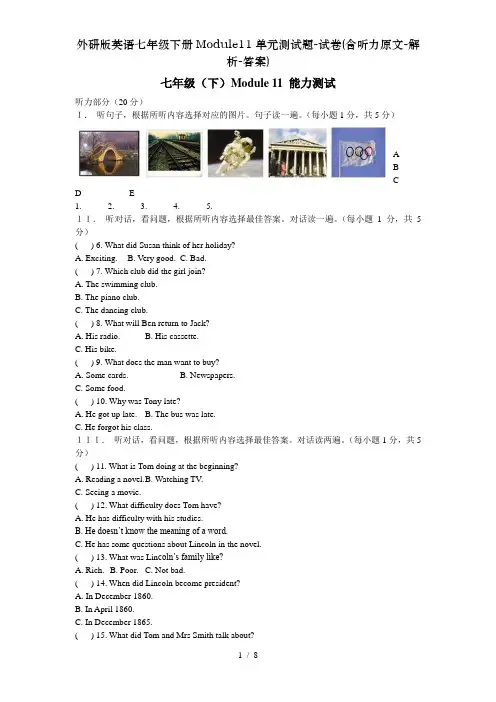
七年级(下)Module 11 能力测试听力部分(20分)I.听句子,根据所听内容选择对应的图片。
句子读一遍。
(每小题1分,共5分)ABCD E1. _____2. _____3. _____4. _____5. _____II.听对话,看问题,根据所听内容选择最佳答案。
对话读一遍。
(每小题1分,共5分)( ) 6. What did Susan think of her holiday?A. Exciting.B. Very good.C. Bad.( ) 7. Which club did the girl join?A. The swimming club.B. The piano club.C. The dancing club.( ) 8. What will Ben return to Jack?A. His radio.B. His cassette.C. His bike.( ) 9. What does the man want to buy?A. Some cards.B. Newspapers.C. Some food.( ) 10. Why was Tony late?A. He got up late.B. The bus was late.C. He forgot his class.III.听对话,看问题,根据所听内容选择最佳答案。
对话读两遍。
(每小题1分,共5分)( ) 11. What is Tom doing at the beginning?A. Reading a novel.B. Watching TV.C. Seeing a movie.( ) 12. What difficulty does Tom have?A. He has difficulty with his studies.B. He doesn’t know the meaning of a word.C. He has some questions about Lincoln in the novel.( ) 13. What was Lin coln’s family like?A. Rich.B. Poor.C. Not bad.( ) 14. When did Lincoln become president?A. In December 1860.B. In April 1860.C. In December 1865.( ) 15. What did Tom and Mrs Smith talk about?A. They talked about a novel about Lincoln.B. They talked about evening news about Lincoln.C. They talked about a movie about Lincoln.IV.听短文,根据所听内容选择正确的答案。
外研版英语七年级下Module 11 Body language 模块检测试卷第一局部听力〔10分〕Ⅰ.录音中有五个句子, 听一遍后, 选择句中所包含的信息。
1. A. hands B. heads C. hard2. A. north B. noses C. bosses3. A. food B. feet C. foot4. A. foreign B. friends C. fridge5. A. Indian B. England C. India(Ⅱ)录音中有一篇短文, 听两遍后, 补全句中所缺信息。
6. ______ ______ is very important in everyday life.7. In the west, people look at ______ ______ when they talk.8. When a man ______ ______ with a woman, it is polite for the woman to hold out her hand first.9. In the west, men and women touch each other ______ ______ than men and women touch each other in China.10. ______ ______ often kiss each other to greet.第二局部笔试〔90分〕Ⅲ.单项选择(10分)1. The visitors are from foreign countries. They’re ______.A. RussiaB. EnglishmanC. FranceD. Japanese2. ______ people touch noses when they meet.A. RussianB. GermanC. MaoriD. British3. ______ so busy every day. Learn to enjoy your life!A. NotB. Not beC. Don’tD. Don’t be4. —What do they do when they meet?—________A. They’re workers.B. They come from China.C. They often shake hands.D. They are fine.5. Mr Lee is leaving. Let’s go and ______ “goodbye〞to him.A. speakB. sayC. talkD. tell6. —Give my best wishes to your uncle.—______.A. No, I don’tB. OK, I willC. Yes, I doD. Yes, I would7. Don’t stand too ______ to North Americans!A. to closeB. closedC. closeD. closing8. I think it’s ______ to say nothing if someone helps you.A. kindB. rudeC. clearD. polite9. In fact, I don’t like the song ______.A. in allB. for allC. at allD. after all10. It is polite ______ somewhere else in some places.A. lookB. lookedC. looksD. to lookⅣ.完形填空(10分)Body language is very important. It can make others understand (理解) you easily. When you are talking with others, you are ___1___ only using words, but also using body language. In China, waving your ___2___ is to say “goodbye〞. Smiling and clapping hands (拍手) mean “___3___〞. Nodding the head means “yes〞, and sh aking the head means “no〞. Different countries have different body language. People in Russia kiss ___4___other when they meet, but people in China shake ___5___. People in some countries like touching each other, but many people in Britain don’t like oth ers to touch them ___6___ all. People in the Middle East like standing close to others when they are talking, but you have to give people from North America more ___7___ space when you’re talking with them. In some Asian countries, it’s not polite ___8___ the head of others. People from other countries may not understand your language, ___9___ they may understand your body language. Body language can help you get ___10___ well with others.1. A. just B. not C. then D. /2. A. leg B. nose C. ear D. hand3. A. welcome B. goodbye C. hello D. thanks4. A. the B. an C. each D. every5. A. heads B. hands C. feet D. fingers6. A. in B. on C. of D. at7. A. personal B. person C. persons D. person’s8. A. touch B. to touch C. touching D. touches9. A. if B. but C. so D. because10. A. from B. in C. on D. forⅤ.阅读理解(20分)AWhen we don’t understand each other’s langua ge, we talk with the help of signs.A Frenchman was once traveling in England. He could not speak English at all. One day he went into a restaurant and sat down at a table. When the waiter came, he opened his mouth, put his finger into it and took it out again. The waiter soon brought him a cup of tea. The man shook his head. The waiter took away the tea and then he brought him a cup of coffee. The man again shook his head. Then the waiter brought him a lot of drinks,but the man still shook his head. Of course, drinks are not food.When the man was leaving, another man came in. This man saw the waiter, and he put his hands on his stomach. That was enough. In a few minutes, there was a large plate of meat and vegetables on the table in front of him. How clever he was!1. What does the underlined word “signs〞mean in Chinese?A. 标记B. 招聘C. 手势D. 迹象2. The Frenchman wanted the waiter to ______.A. translate the wordsB. tell him what he saidC. bring him a cup of coffeeD. bring him some food3. The waiter brought the Frenchman ______.A. a cup of tea, a cup of coffee and a lot of other drinksB. a large plate of rice and vegetablesC. a cup of water and a cup of coffeeD. a piece of paper and a pen for him to write down the words4. Another man saw the waiter, and put his hands on his stomach. He meant ______.A. he was hungryB. he was very thirstyC. he had a stomachache (胃疼)D. he had enough food5. What’s the best title (题目) of the story?A. The WaiterB. A FrenchmanC. The Language in the RestaurantD. Sign LanguageBAmericans are very direct people. When they want something, they say “Yes〞. When they don’t want, they say “No〞. If they want something different from what is given, they will ask for it. Here’s an example.I arrive at s omeone’s house and he or she gives me wine, but I don’t want wine. Maybe I don’t like it or maybe I just don’t want it. I will say “No, thanks〞. If everyone around me is drinking something, I would ask for something else and say, “No, thanks. But I’ll take a cup of t ea.〞If I really want wine, I just say “Yes, please〞. Unless they happen to know the Chinese customs (风俗;习惯), westerners will not ask you again and again after you have said you don’t want it.6. According to the passage, ______ are direct.A. ChineseB. AmericansC. JapaneseD. Australians7. If Americans want something, they would say “______〞.A. Yes, pleaseB. No, thanksC. No, I’m sorryD. Yes, I don’t like it8. In this passage, the underlined word “westerners〞means ______.A. the people who lives in the west of their countyB. the visitors who go to the western countriesC. the people who lives in the western countriesD. the people who know the customs of the west9. The Chinese people might ______ if you don’t want something given.A. be gladB. sa y “thank you〞C. get angryD. ask you again and again10. From this passage we know that ______.A. the Chinese people are directB. The Chinese customs are betterC. the westerners are more politeD. Different countries have different customsⅥ.阅读表达(10分)I had a great time on May Day. I went to Beijing on that day. This was my first visit to Beijing. We went there by train for holiday. ①在火车上有太多的人, but we still liked the journey. We took many pictures of our trip. We went to Tian’anmen, Wan gfujing Street, the Palace Museum and the Summer palace. At the square, we saw the soldiers rising the flag. Many people were waiting for the flag rising time there when it was dark. We went to the Great Wall on May 3rd. How excited I was! It was the happiest time in my life. It was happier than I got a big present. ②We came back on May 4th. And we bought a lot of things, like Beijing Roast Duck. When we got off the train, I fell off (摔倒) and hurt (伤害) my leg. I think this was the worst thing.1. Why did we go to Beijing?________________________________________2. Did we take many pictures?________________________________________3. How did I feel when I was on the Great Wall?________________________________________4. 将①处的汉语翻译成英语。
初中英语外研版七年级下册Module11 Body language单元练习一、听力(听力)(共25小题;共25分)一、录音中有五个句子,每个句子听一遍,然后从每小题A、B、C中选出适合每个句子的答语。
1. A. Yes, of course.B. Wait a minute, please.C. What a pity!2. A. Oh, I'm sorry. I went to the school library.B. What time did you call me?C. I was in the school library.3. A. It's my pleasure.B. Motorola is more popular.C. I know, anyway.4. A. Sure, I will. B. Sorry, I won't. C. Thank you.5. A. A week later. B. About a week. C. In a week.二、录音中有五组对话,每组对话听一遍,然后从每小题A、B、C中选出能回答每个问题的正确答案。
6. How many people were killed in this accident?A. Three.B. Fifty.C. Fifteen.7. How did the man like the football game?A. It was a poor game.B. Half of the game was good.C. Both the man's friend and he himself liked it.8. What does the man mean?A. He's tired.B. He's free.C. He's busy.9. What time will they meet?A. They will meet at 7:30.B. They will meet at 8:00.C. They will meet at 8:30.10. How does the man usually go to work?A. By car.B. On foot.C. By bike.三、录音中有一段对话,听对话两遍,然后从每小题A、B、C中选出能回答每个问题的正确答案。
Module 11 Body language 达标测试卷时间:120分钟满分:120分第一部分听力(共四大题,满分20分) 一、短对话理解(共5小题;每小题1分, 满分5分)()1. What do they do when they meet friends in the US?()2. Where are the two speakers?()3. Which part of Eric's body can't move?A. Feet.B. Ears.C. Fingers.()4. What did Mr Green think of the plan?A. Good.B. Not good.C. So bad.()5. What can the girl do to be polite when she talks to people?A. Bow.B. Nod.C. Smile.二、长对话理解(共5小题;每小题1分, 满分5分)听下面一段对话, 回答第6、7小题。
()6. Who knows any body language?A. Linda.B. Peter.C. Jim.()7. What will Linda do when she meets Tom?A. She'll hug him.B. She'll kiss him.C. She'll shake hands with him.听下面一段对话, 回答第8至10小题。
()8. What colour is Ms Wang's dress?A. Red.B. White.C. Purple.()9. What does Ms Wang teach?A. English.B. Chinese.C. Japanese.()10. What can the students do when they meet Ms Wang?A. Kiss her.B. Nod to her.C. Shake hands with her.三、短文理解(共5小题;每小题1分, 满分5分)()11. What is very important in everyday life?A. Body language.B. English.C. First language.()12. What do people look at when they talk in the West?A. Somewhere else.B. The floor.C. Each other.()13. How many times do people shake hands when they talk in the West?A. Two or three times.B. Five or six times.C. Seven or eight times.()14. Where do men and women touch each other more often?A. In the West.B. In China.C. In Japan.()15. Who often kiss each other to greet?A. Parents.B. Good friends.C. Sisters.四、信息转换(共5小题;每小题1分, 满分5分)第二部分英语知识运用(共两大题, 满分30分)五、单项填空(共10小题;每小题1分, 满分10分)()21. His grandmother's ______ are not OK. She can't walk very well.A. kneesB. armsC. fingersD. eyes()22. ______ sunny day it is! I really enjoy the bright sunlight.A. How aB. HowC. WhatD. What a()23. Ann and I are good friends. We often play ______ in the park.A. aloneB. togetherC. soonD. again()24. Russian people's body language is ______ that of Japanese.A. different fromB. different inC. the same asD. the same()25. Sugar tastes (尝起来) sweet. But ______ , it's bad to eat too much.A. for exampleB. such asC. in factD. at last()26. Every time in the supermarket, my mom asks me to ______on to her hand, so I won't get lost.A. openB. riseC. washD. hold()27. ______ watch TV. It's too late. You need to go to bed.3A. NotB. Not toC. Don'tD. Doesn't()28. —Jenny is a(n) ______ girl.—Yes! When you meet her, she always says hello to you.A. strongB. politeC. difficultD. interesting()29. Jim is ______ kind to others, so all the classmates like him.A. neverB. sometimesC. seldomD. always()30. —Jack, the information you gave is really helpful. Thank you very much.—______. I'm happy I can help you.A. Of course notB. Not at allC. Yes, pleaseD. No, thanks六、完形填空(共20小题;每小题1分, 满分20分)AIt was a special day for Miranda Collins today. Because today wasthe first __31____ for her to meet the students. And she __32____good in the morning. Miranda Collins walked to school __33____. Lotsof students went to school on foot, __34____. They talked with theirfriends happily on the way to school. When Miranda got to the school gate, she found many __35____ were there.At eight thirty, the bell rang (铃响)and the students went into __36____ classrooms. Miranda found the right classroom and __37____ it. All the children stopped (停止)talking. She went to the desk in the front of the __38____. Then Miranda looked around the classroom with a beautiful smile __39____ her face. “Good morning, everyone, ” she said. “I am Miss Collins, your __40____ teacher. ” Then the students gave her a warm welcome.()31. A. day B. week C. month D. year()32. A. played B. felt C. walked D. tried()33. A. late B. else C. well D. alone()34. A. too B. either C. also D. as well()35. A. cleaners B. students C. drivers D. nurses()36. A. our B. your C. their D. her()37. A. entered B. went C. came D. hurried()38. A. school B. playground C. classroom D. lab()39. A. in B. at C. on D. to()40. A. new B. popular C. modern D. strictBWe use body language to send messages to others. It is very ____41____ because others can understand you easily when you use body language. When you are talking with others, you are not only using words, but also using ____42____. For example, waving one's hand is to say goodbye. Shaking hands means welcome, and clapping hands ____43____ congratulations (祝贺). Nodding one's head means YES, but shaking the head means NO.Different countries have ____44____ body language. For example, when in ____45____, France and Arab countries, people kiss each other when they meet, ____46____ people in China and Australia shake hands instead of kissing. People in Puerto Rico like touching each other, but people in Britain do not like touching each other. People in Arab countries like ____47____ close to one another when they are talking, but English people must keep a distance when they are talking. It is very important ____48____ the meanings of gestures and movements in the foreign country ____49____ they will help you communicate with people and make you stay there much more ____50____ and comfortable.()41. A. helpful B. difficult C. harmful D. useless()42. A. words B. gestures C. handshakes D. hands()43. A. to mean B. mean C. means D. meaning()44. A. the same B. a same C. difference D. different()45. A. Russia B. the Russia C. Russian D. a Russia()46. A. and B. or C. but D. so()47. A. stand B. stands C. sit D. standing5()48. A. knowing B. know C. to know D. knows()49. A. when B. because C. so D. if()50. A. important B. sad C. interesting D. pleased第三部分阅读理解(共两大题, 满分45分)七、补全对话(其中有两项多余)(共5小题;每小题1分, 满分5分)A:You must be really excited about tomorrow's leaving for America, Li Ping!B:Yeah. 51. ______A:Nervous about what?B:I don't know many of the customs (风俗) or manners in the USA. 52. ______ A:Sure.B:53. ______A:Well, it's important to be on time when you're invited to dinner. 54. ______ Americans want their guests to be on time.B:Then how long may I stay there?A:55. ______ Or you seem to have come only for the meal. When your friends seem to be getting tired and the food is running out, it's time to leave. The next day, call your friends or write them a thank-you note to say how much you enjoyed the evening.八、阅读理解(共20小题;每小题2分, 满分40分)APeople in different countries greet(问候) each other in different ways. Here aresome examples.()56. Men bow and shake hands to greet each other in ______.A. the United StatesB. South KoreaC. FinlandD. the Philippines()57. In the US and Finland, ______ usually hug or kiss to greet each other.A. all peopleB. menC. close friends and family membersD. women()58. People greet each other with a handshake in ______.A. the United StatesB. South KoreaC. the PhilippinesD. All of the aboveBMany people in Britain live in houses with gardens. They like planting some flowers in the gardens. It makes them feel happy to see those beautiful flowers.In Britain, people usually work from about 9 a. m. to 5 p. m. on weekdays, and they don't go home for lunch. They may have some fast food. However, family will get together and have a big meal in the evening. During the meal, they will share7something interesting or the news they know.For students, their school life is colorful and interesting. Classes begin at about 8:00 in the morning.Students spend seven hours at school every day. And they have different activities after school. There are different kinds of clubs. Each student can join one or more clubs.Shopping in Britain is also very convenient(便捷的). Shops open at about nine in the morning and close at about six in the afternoon on weekdays. Many supermarkets stay open twenty-four hours a day.()59. How many hours do people in Britain work on weekdays?A. Ten.B. Nine.C. Eight.D. Seven.()60. What do students in Britain think of their school life?A. Interesting.B. Boring.C. Tiring.D. Important.()61. If you want to buy something in a shop in Britain, when can you go there?A. At 8 a. m.B. At 4 p. m.C. At 8 p. m.D. At 9 p. m.()62. According to the passage, which of the following is TRUE?A. People in Britain all live in houses with gardens.B. People in Britain usually have fast food for lunch.C. Students in Britain can only choose one club at school.D. Many supermarkets stay open twenty hours a day.CWhen you go to the US, someone often says to you, “Give me five!”What should you do? Don't give five dollars from your pocket! It will make others laugh! The person is not asking for your money, but your fingers.In the US, “Give me five!” or “Give me high five!” is a hot gesture (手势). You can see it in films or on TV. It means hitting each other's hands together.People do it when they meet for the first time or some happy things happen. Forexample, a student has good marks in an exam. If a football team wins a game, the players will give high five to everyone around to celebrate.This gesture may come from the old Roman gesture of raising the right arm for the king. This showed the person raising his arm didn't have a sword (剑) in his hand. Why not try to give high five to your friends?()63. You need to use your ______ to make the gesture “Give me five!”.A. legsB. feetC. headsD. hands()64. Why do people make t he gesture “Give me five!”?A. To make people laugh.B. To ask for money.C. To say hello to others.D. To ask for help.()65. When you ______, you can give your friends high five.A. lose your moneyB. win a football gameC. start your lessonsD. find a difficult word()66. What did the Romans raise their right arms for?A. Because they were afraid of the king.B. Because they were happy to see the king.C. Because they wanted to give the king a welcome.D. Because they wanted to show there were no swords in their hands.DDear Grandpa,How is it going? This morning I found a baby bird by the window. It woke me up at about 6 o'clock. It looked so small and helpless. It couldn't fly. I put it on my bed and fed it some bread and water. There aren't many trees around my neighborhood. Does it live on the roof (屋顶)?At 7 o'clock, Dad came in with a cup of milk before I hid (藏) the bird. I thought he might be angry, but he wasn't. He took it from me and made a home for it in the9kitchen. We will feed it every day. When it gets bigger, we will let it go. I wish I could keep it, but I know that it should be free. The bird is very cute and beautiful. I think you must like it. Would you like to see it next weekend?Bye for now.Yours,Mike ()67. Where did Mike find the bird?A. In the kitchen.B. By the window.C. On his bed.D. In a tree.()68. What did Mike's father do?A. He fed the bird some food.B. He put the bird on the roof.C. He found the bird's mother.D. He made a home for the bird.()69. Which of the following is TRUE?A. Mike will keep the bird as a pet.B. Mike doesn't know how to feed the bird.C. Mike isn't sure where the bird lives.D. Mike worries about the health of the bird.EWhen we don't understand each other's language, we can use our body language to talk.In America, when you are talking, you'd better look at the other person in the eye. If you don't do so, it means you are unhappy, or you are not interested in something.In China, raising the thumb (拇指) me ans “good”and“great”, and raising the smallest finger means “bad”. In America, people put the thumb up when they want to get a ride, and they put the thumb down to show “bad”. In America, waving hands means “goodbye”, but in South Africa, people will run t owards you if you wave your hands to them. The Russians put fingers on the throat (咽喉) to show they are full. In China, America and Japan, it's polite to close your mouth when you are eating food.But it's polite to open your mouth when you are eating in India.Learning body language is sometimes difficult. If you don't know what to do, the best thing for you is to smile.()70. In China, if you want to express (表达) “bad”, you can ________.A. raise your thumbB. raise the smallest fingerC. put your thumb upD. wave your hand()71. In which country is it polite to open your mouth when you are eating?A. China.B. America.C. Japan.D. India.()72. If you don't know what to do, the best thing for you is ______.A. to smileB. to raise your thumbC. to raise your smallest fingerD. to open your mouth阅读下面短文, 并用英语回答问题(请注意每小题后面的词数要求)。
一、选择题1.They can’t see ________ in the dark.A.something B.anything C.everything D.nothing 2.Be quiet, children. I can’t _______ your father.A.listen B.hear C.see D.look 3.—Did Molly go to the library yesterday?—_______.A.Yes, she was B.Yes, she is C.Yes, she does D.Yes, she did 4.—Did Mike go to the sports center yesterday?—_______. He went to the library.A.Yes, he was B.No, he wasn’tC.Yes, he did D.No, he didn’t5.—Did you take any photos in the zoo?—________. But Dave took some.A.Yes,I was B.No,I wasn’t C.Yes,I did D.No,I didn’t 6.— How was your trip to Hangzhou, Jim?— Great! We ________ to Xixi National Wetland Park.A.go B.am going C.goes D.went 7.We ________ the train to the museum last week.A.ride B.rode C.take D.took 8.Wow!There are so m any books. I really don’t know________.A.where to buy B.when to buy. C.which one to buy D.how to buy 9.This is a _______ train. It will take a long time to get there.A.slow B.dirty C.noisy D.scary 10.My brother taught me how ________ a model plane yesterday.A.make B.to made C.made D.to make 11.(题文)Yesterday, we ______ to the park and _____ a good time there.A.go; have B.went; have C.went; had D.goes; had12.The girl enjoys the radio very much.A.listening B.to listen C.listening to D.to listen to 13.—How was your trip?—It was __________. We had a good time.A.boring B.interesting C.terrible D.bad 14.— ?—I watched TV at home.A.How was your weekend B.Where did you goC.What did you do D.When did you watch TV15.Lin Ling ______ with his cousin last Sunday.A.rides a horse B.pick applesC.took a walk D.is watering flowers16.—Who did you go to the zoo ______?—My family.A.of B.with C.in D.around17.—Is the book ______?—Yes,I'm really ______ in it.A.interesting;interested B.interesting;interesting C.interested;interested D.interested;interesting18.My brother ______ to the movies yesterday. He stayed at home.A.go B.didn’t went C.didn’t go D.wasn’t go19.We went to the Great Wall ______ vacation.A.at B.on C.for D.to20.L ily’s mother bought a new piano her last week.A.on B.with C.in D.for【参考答案】***试卷处理标记,请不要删除一、选择题1.B解析:B【解析】句意:他们在黑暗中不能看到任何东西。
Module 11 Body language达标测试卷时间:100分钟满分:120分第一卷听力部分(25分)一、听句子, 选出一个你所听到的词语。
每句话读两遍。
(每小题1分, 共5分) ()1. A. feet B. hands C. mouths()2. A. Chinese B. Japanese C. Russians()3. A. together B. alone C. tomorrow()4. A. hair B. dress C. smile()5. A. eat B. jump C. move二、听句子, 选择合适的图片。
每句话读两遍。
(每小题1分, 共5分)()6.()7.()8.()9.()10.三、听对话, 根据所听内容选择正确答案。
每段对话读两遍。
(每小题1分,共5分)听第一段对话, 回答11、12题。
()11. Why don't Chinese people like to look into others' eyes when they are talking?A. Because they are shy.B. Because they are afraid.C. Because it is rude.()12. What do Americans like doing with their friends?A. They like hugging.B. They like laughing.C. They like nodding.听第二段对话, 回答13-15题。
()13. When should you be there to a Chinese dinner?A. Some time early.B. Some time later.C. On time.()14. Don't make much noise when you eat____.A. noodlesB. fruitC. soup()15. When you finish the food, you should____.A. go awayB. clean the tableC. talk with others四、听短文, 根据所听内容完成短文。
Module11 Body language达标检测卷一、听力(听力)(共25小题;共25分)一、录音中有五个句子,每个句子听一遍,然后从每小题A、B、C中选出适合每个句子的答语。
1. A. Yes, of course.B. Wait a minute, please.C. What a pity!2. A. Oh, I'm sorry. I went to the school library.B. What time did you call me?C. I was in the school library.3. A. It's my pleasure.B. Motorola is more popular.C. I know, anyway.4. A. Sure, I will. B. Sorry, I won't. C. Thank you.5. A. A week later. B. About a week. C. In a week.二、录音中有五组对话,每组对话听一遍,然后从每小题A、B、C中选出能回答每个问题的正确答案。
6. How many people were killed in this accident?A. Three.B. Fifty.C. Fifteen.7. How did the man like the football game?A. It was a poor game.B. Half of the game was good.C. Both the man's friend and he himself liked it.8. What does the man mean?A. He's tired.B. He's free.C. He's busy.9. What time will they meet?A. They will meet at 7:30.B. They will meet at 8:00.C. They will meet at 8:30.10. How does the man usually go to work?A. By car.B. On foot.C. By bike.三、录音中有一段对话,听对话两遍,然后从每小题A、B、C中选出能回答每个问题的正确答案。
七年级(下)Module 11 能力测试听力部分(20分)I.听句子,根据所听内容选择对应的图片。
句子读一遍。
(每小题1分,共5分)A B C D E1. _____2. _____3. _____4. _____5. _____II.听对话,看问题,根据所听内容选择最佳答案。
对话读一遍。
(每小题1分,共5分)( ) 6. What did Susan think of her holiday?A. Exciting.B. Very good.C. Bad.( ) 7. Which club did the girl join?A. The swimming club.B. The piano club.C. The dancing club.( ) 8. What will Ben return to Jack?A. His radio.B. His cassette.C. His bike.( ) 9. What does the man want to buy?A. Some cards.B. Newspapers.C. Some food.( ) 10. Why was Tony late?A. He got up late.B. The bus was late.C. He forgot his class.III.听对话,看问题,根据所听内容选择最佳答案。
对话读两遍。
(每小题1分,共5分)( ) 11. What is Tom doing at the beginning?A. Reading a novel.B. Watching TV.C. Seeing a movie.( ) 12. What difficulty does Tom have?A. He has difficulty with his studies.B. He doesn’t know the meaning of a word.C. He has some questions about Lincoln in the novel.( ) 13. What was Lincoln’s family like?A. Rich.B. Poor.C. Not bad.( ) 14. When did Lincoln become president?A. In December 1860.B. In April 1860.C. In December 1865.( ) 15. What did Tom and Mrs Smith talk about?A. They talked about a novel about Lincoln.B. They talked about evening news about Lincoln.C. They talked about a movie about Lincoln.IV.听短文,根据所听内容选择正确的答案。
短文读两遍。
(每小题1分,共5分)( ) 16. Where was Alexander Graham Bell born?A. In Edinburgh, Scotland.B. In the United States.C. In West Germany.( ) 17. When was Alexander Graham Bell born?A. On March 3, 1847.B. On March 3, 1862.C. On March 3, 1874.( ) 18. Where did Alexander Graham Bell get more education?A. In Edinburgh.B. In London.C. In Paris.( ) 19. What was Bell’s main interest in when he was a young man?A. Helping the poor people.B. Helping the black people.C. Helping the deaf (聋的) people.( ) 20. In which year did Bell begin to invent (发明) the telephone?A. In 1873.B. In 1874.C. In 1876.基础知识运用(20分)I.从A、B、C、D四个选项中选择最佳答案。
(每小题1分,共10分)( ) 21. — _____ do you _____ my new clothes? — Very nice.A. How; thinkB. What; look atC. What; think ofD. How; think about( ) 22. — _____ did Charles live in the village?—For about 30 years.A. How longB. How oldC. How manyD. How much( ) 23. — __________________?—He is a pilot.A. What is he likeB. How old is heC. What does he doD. How is he( ) 24. China is now the third country _____ a person into space. A. send B. to send C. sending D. sent( ) 25. — When _____ the girl ______ Beijing?—Two days ago.A. does; arrive atB. does; get toC. did; arriveD. did; reach( ) 26. — What can you see in the picture?—I can see a bridge _______ the river.A. atB. inC. overD. behind( ) 27. I saw ____ girl picking up a pen on the road.A. an 8 years oldB. 8-year-oldC. an 8 year-oldD. an 8-year-old( ) 28. It is difficult for the little girl _______ the homework alone.A. doesB. to doC. doingD. did( ) 29. — _____ did you play tennis yesterday?—In the gym.A. WhereB. WhatC. WhenD. Why( ) 30. — _________ he absent this morning?—Because he was ill.A. Why didB. Why wasC. How wasD. How didII.完形填空。
(每小题1分,共10分)Henry was walking in the park with his dog, Frank. Then he saw his friend Sally with a 31 , too. They sat on the chair and began 32 . And the dogs ran off together. After a few minutes, they became 33 . “I want to know 34 my Frank is,” he said. “I want to know where my Linda is,” she said.So, they went to 35 their dogs together, 36they couldn’t find them. Two days 37 , Henry telephoned Sally. “Did your dog come home?”he said. “Yes,”she answered. “38 did you find it?”“I put an advertisement (广告) in the 39 and I got it back yesterday. Why don’t you have a try?”“I can’t put an advertisement in the newspaper, ” he said, “because Frank can’t 40 .”( ) 31. A. cat B. dog C. kite D. rabbit( ) 32. A. running B. flying C. talking D. singing ( ) 33. A. worried B. happy C. excited D. tried( ) 34. A. who B. what C. where D. when ( ) 35. A. look at B. look afterC. look upD. look for( ) 36. A. and B. but C. or D. for( ) 37. A. late B. before C. later D. after( ) 38. A. Where B. HowC. How oftenD. What about( ) 39. A. newspaper B. wallC. TVD. street( ) 40. A. look B. watch C. listen D. read阅读理解(20分)III.按要求完成文后各题。
(每小题2分,共20分)AWhen Americans were getting ready to send their first men to the moon, an old Irishman (爱尔兰人) was watching them on television in a bar.There was an Englishman in a bar, too, and he said to the Irishman, “Americans are very clever, aren’t they? They are going to send some men to the moon. It’s a very long way from the earth.”“Oh, that’s nothing,”the Irishman answered quickly. “The Irish are going tosend men to the sun in a few months’ time. That is much farther away than the moon, you know.” The Englishman was very surprised when he heard this. “Oh, yes, it is,” he said. “But the sun is too hot for people to go to.”The Irishman laughed and answered, “Well, the Irish are not stupid, you know. We won’t go to the sun during the day, of course. We’ll go there during the night.”根据短文内容,选择最佳答案。